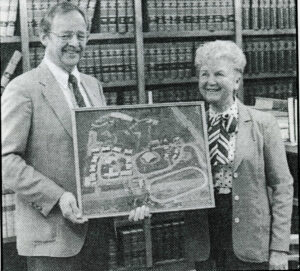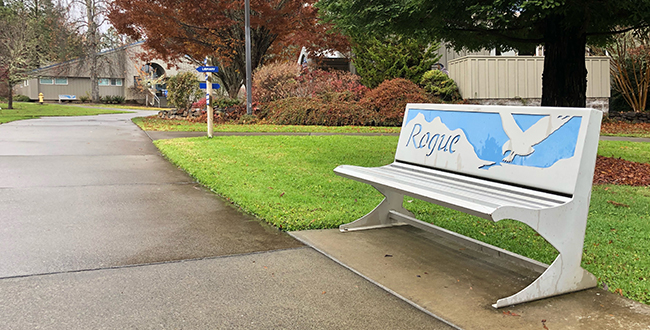In 1969, three people sat around a table with an idea—to transform the old Fort Vannoy Job Corps campus into a bustling center of higher education. Community leaders Bill Ford, Marjorie Holzgang and newcomer Phil Nelson—a local attorney, the youngest of the group—are credited today for founding Rogue Community College, a staple of Rogue Valley culture and opportunity. But imagine fifty years ago, when Jackson and Josephine counties were one of the few regions in Oregon without a local college. Why did this team of visionaries fight so hard to start one?
“I just felt the Job Corps buildings were sitting there and could be used for public good. I really wanted to do something with that facility for people, particularly for youth,” Phil said. “At that time my first child was born; I had a little baby, and I remember looking down at her in her playpen and thinking we need to do something for these kids, we’ve got to have a place for them to learn.”

Humble beginnings
Phil and his fellow founders worked tirelessly to develop plans and advocate for a local college. Phil was particularly involved in publicity, speaking to countless community groups and writing flyers to rally support. When the plans eventually passed a hard-fought community election as well as a tight vote from the state board of education, Phil and his comrades got straight to work—this time not just planning, but building.
“The work was terribly exciting,” Phil said. The founders were thrilled to acquire Fort Vannoy through a federal lease costing only one dollar a year. “The new college, under the leadership of its first president, Henry Pete, did a lot of repair work and remodeling, took barracks and made them into classrooms,” Phil recalled. “We had all kinds of buildings and roads; it was just a lovely place.”
Eventually, the government handed over the property deed to the community college district, and RCC’s flagship campus has remained there ever since.
Making his mark
Phil continued to serve the college for several years beyond its grand opening, working as RCC’s attorney as well as an instructor of business law. Beyond work, Phil also made time to pursue his personal interests at RCC as an art student.
“I’d always had an interest in sculpture, so I decided to indulge it and began taking classes,” Phil said. He developed a skill for fabricated steel art and became an advocate for sculptors throughout the region. First Phil established a local club called the Grants Pass Community Sculpture Association, which then led to starting a business called Oregon Sculpture Studios, where artists could design and sell their work. Phil became a purveyor of large-scale steel sculptures, connecting artists to exclusive galleries where their pieces could be sold to buyers around the world.
True to his hometown heart, though, Phil made sure to leave a mark on his beloved RCC by designing art pieces that are now displayed on campus. These include an abstract sculpture titled “Community,” which Phil dedicated to his colleague Marj Holzgang. He also designed half a dozen steel benches embossed with a river and mountain landscape featuring the silhouette of an Osprey, which are stationed throughout the RCC Redwood Campus.

Small town support
When Phil first moved to Grants Pass from San Francisco in the 1960s, he knew he was trading city life for something richer. He believes “small towns are better” because people can work together to accomplish goals without the complexity of bureaucracy and divisive opinions.
“The community was absolutely inspirational,” says the long-time Grants Pass resident who is now living out his golden years with his wife in Portland, where they are near family. “The people who were involved in the community at that time were terribly supportive. Everybody pitched in. RCC was a great community effort, something the town put together. Marj said—it was the people’s college, and the people did it.”
In addition to Phil, Marj and Bill, several more community members were involved in making RCC a reality. Midge Renton, Anne Basker and Margaret Baldini were early supporters and planning committee members, joined later by Bob Rust, Lewis Krauss, Lyle Haley and Ben Wright on RCC’s first board of directors. Generous donors such as local car dealers and Al Klassen of Rogue River Hardware contributed significant funds to get RCC up and running.
In the years that followed, the college expanded to neighboring communities and today serves an average of 15,000 students every year across multiple facilities in the region. One thing every RCC student and graduate has in common, though, is a debt of gratitude—to the college’s original founders.
“It was a time and a place when things came together and we were able to do something that had major import for the area,” Phil said. “We were one of the very few places in the state not served by a community college, and now RCC is the sixth or seventh largest community college in the state. We can be very proud of that.”
